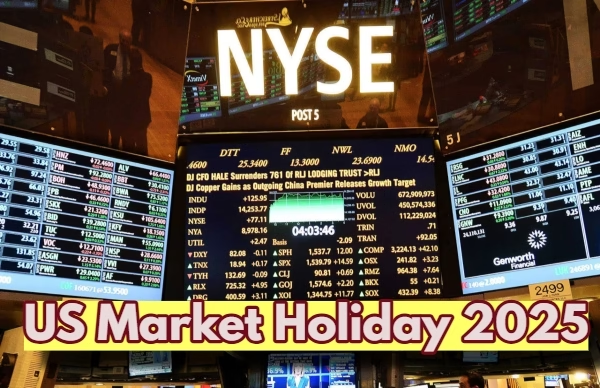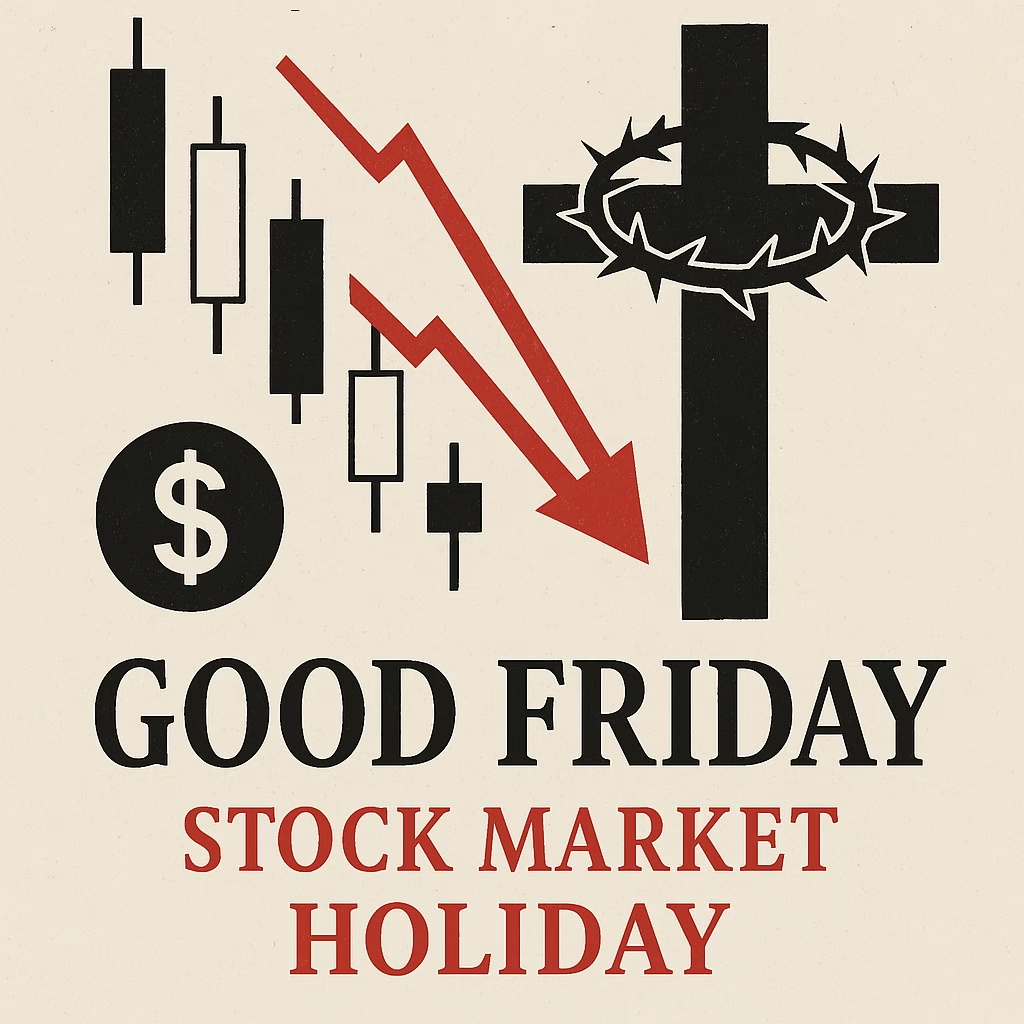The financial world operates on its own calendar, punctuated by a series of market holidays that temporarily pause the frenetic pace of trading. Among these breaks, the Good Friday stock market holiday stands as a notable occasion when trading floors fall silent and digital platforms cease their operations. Whether you’re a seasoned investor planning your trading strategy or a market newcomer wondering why exchanges close for this religious observance, understanding the implications of the Good Friday stock market holiday is essential for anyone involved in financial markets. This comprehensive guide explores the history, significance, and practical implications of this important trading calendar event in 2025.
Understanding the Good Friday Stock Market Holiday
Good Friday represents one of the most significant religious holidays in the Christian calendar, commemorating the crucifixion of Jesus Christ. Observed on the Friday before Easter Sunday, it falls on different dates each year, determined by the lunar calendar. For 2025, Good Friday lands on April 18, marking a pause in trading activities across major financial centers worldwide.
What is Good Friday and Its Significance
Good Friday, also known as Holy Friday or Great Friday in some traditions, marks the solemn remembrance of Jesus Christ’s crucifixion at Calvary (Golgotha). For Christians worldwide, this represents a day of reflection, prayer, and acknowledgment of sacrifice. The term “Good” in Good Friday might seem counterintuitive for a day commemorating death, but many religious scholars suggest it derives from an older meaning of “good” as “holy” or from “God’s Friday.”
While primarily religious in nature, Good Friday has transcended its spiritual origins to become integrated into the financial calendar, affecting millions of investors regardless of their religious affiliations.
Historical Background of Market Closures on Good Friday
The tradition of stock markets closing on Good Friday dates back to at least the late 19th century. The New York Stock Exchange (NYSE), America’s oldest stock exchange, has maintained this practice throughout its modern history. This closure persisted even as trading evolved from physical floor exchanges to computerized systems spanning the globe.
Interestingly, while many official holidays have shifted or been renamed over the decades, the Good Friday stock market holiday has remained remarkably consistent. This persistence reflects both respect for religious tradition and recognition of practical benefits that come with synchronized market closures, demonstrating how cultural practices can become embedded in financial systems.
Why Does the Stock Market Close on Good Friday?
One of the most intriguing aspects of the Good Friday stock market holiday is that markets close despite Good Friday not being a federal holiday in the United States. This anomaly puzzles many newcomers to the financial world, who wonder why trading grinds to a halt when most government offices, postal services, and many businesses remain open.
Religious and Traditional Factors
The primary historical reason for the Good Friday closure reflects the religious significance of the day. As financial centers developed in predominantly Christian societies, observing major Christian holidays became standard practice. While society has become increasingly secular, these traditions have remained embedded in market operations.
For many financial professionals, regardless of personal religious beliefs, the Good Friday market holiday represents a respected tradition that has withstood the test of time even as markets have globalized and digitized.
Practical Considerations for Market Closures
Beyond religious observance, several practical factors support maintaining the Good Friday closure:
- Reduced trading volumes – Historically, trading activity naturally decreased on Good Friday as many traders and investors took the day off for religious or personal reasons. Low liquidity can lead to increased volatility and disorderly markets.
- Operational efficiency – Scheduled closures allow for system maintenance, updates, and testing without disrupting regular trading.
- Synchronization with other markets – As international markets also widely observe Good Friday, keeping U.S. markets open would create discrepancies in global trading that could complicate cross-border transactions.
- Extended weekend break – The Good Friday closure creates a three-day weekend that allows market participants to recharge, potentially improving decision-making quality when markets reopen.

Good Friday Closure Despite Not Being a Federal Holiday
The disparity between Good Friday’s status as a market holiday but not a federal holiday in the United States highlights the unique intersection of tradition, practicality, and autonomy in financial markets. Unlike Independence Day or Christmas, which are both federal holidays and market holidays, Good Friday represents a case where financial markets have maintained their own traditions independent of government holiday schedules.
Stock exchanges operate under their own governance and have the authority to determine their own operating calendars, subject to regulatory oversight. The Securities and Exchange Commission (SEC) approves exchange holiday schedules but generally defers to exchange boards regarding which days to observe as holidays. This autonomy allows exchanges to maintain traditions that might have originated from religious observance but now serve multiple purposes in the modern financial ecosystem.
Global Stock Market Closures on Good Friday 2025
The Good Friday stock market holiday extends well beyond U.S. borders, affecting financial centers worldwide. This global observance reflects both shared cultural traditions and the practical necessities of an interconnected financial system.
US Markets: NYSE and NASDAQ
In the United States, both the New York Stock Exchange (NYSE) and the Nasdaq will be completely closed on Friday, April 18, 2025, in observance of Good Friday. This means no trading will occur in U.S. equities markets throughout the entire day. Trading will resume normal hours on Monday, April 21, 2025, opening at 9:30 a.m. Eastern Time.
It’s worth noting that Good Friday is one of ten annual holidays observed by the major U.S. stock exchanges, alongside New Year’s Day, Martin Luther King Jr. Day, Presidents’ Day, Memorial Day, Juneteenth National Independence Day, Independence Day, Labor Day, Thanksgiving, and Christmas.
Bond Market Schedules and Early Closures
The U.S. bond market, which follows guidelines set by the Securities Industry and Financial Markets Association (SIFMA), will also be closed on Good Friday. Additionally, bond markets typically close early at 2:00 p.m. Eastern Time on Thursday before Good Friday, known as Maundy Thursday or Holy Thursday in Christian tradition.
This early Thursday closure gives bond traders a head start on the holiday weekend and represents one of several early closure days throughout the year. Other early closures typically include the day before Memorial Day, the day before Independence Day (when it falls on a weekday), Black Friday, Christmas Eve, and New Year’s Eve.
International Stock Market Observances
Good Friday’s status as a market holiday extends globally, though with some variations:
- European Markets: Major European exchanges including the London Stock Exchange, Germany’s Deutsche Börse, France’s Euronext Paris, and others will be closed on Good Friday 2025.
- Asian Markets: The picture is more mixed in Asia. Hong Kong’s stock exchange will be closed on both Good Friday (April 18) and Easter Monday (April 21). However, some Asian markets like Japan’s Tokyo Stock Exchange, Taiwan’s TWSE, and South Korea’s KOSPI will remain open, as we see from 2025 data showing these markets posted gains while others were closed.
- Australian Markets: The Australian Securities Exchange (ASX) will observe the Good Friday holiday and remain closed.
- Indian Markets: All Indian stock exchanges including the National Stock Exchange (NSE) and Bombay Stock Exchange (BSE) will be closed for Good Friday. The Multi Commodity Exchange (MCX) will also suspend both morning and evening trading sessions.
This global patchwork of closures creates an interesting dynamic for international investors, who must navigate different market schedules when planning their trading strategies. For multinational corporations and global investment funds, these varying schedules require careful coordination, especially for transactions that span multiple markets.
Planning Your Trading Strategy Around Good Friday
For active traders and investors, market holidays like Good Friday require strategic planning to navigate potential volatility and capitalize on opportunities. Understanding how markets typically behave before and after this holiday can help inform better trading decisions.
Pre-holiday Trading Patterns
The trading days leading up to Good Friday often exhibit distinctive patterns:
- Volume considerations: Trading volumes frequently decline as the holiday approaches, with many institutional investors reducing activity or closing positions before the long weekend. This reduced liquidity can sometimes lead to increased volatility or muted price movements, depending on broader market conditions.
- Position squaring: Many traders prefer not to hold uncertain positions over the extended weekend, leading to “squaring up” of positions on Thursday. This can sometimes create directional pressure in markets as traders either lock in profits or cut losses.
- Thursday’s significance: With markets closed on Friday, Thursday effectively becomes the week’s final trading session. In 2025, this falls on April 17, and could see heightened activity as traders make their final moves before the break.
As one example from the search results, Indian markets showed particularly strong performance on the Thursday before Good Friday in 2025, with the Sensex surging 1,508.91 points (1.96%) and Nifty gaining 414.45 points (1.77%). While we can’t predict whether this pattern will repeat in other years, it illustrates how pre-holiday sessions can see significant movement.
Post-holiday Market Behavior
When markets reopen following Good Friday, several factors typically influence trading:
- Information processing: Any news, earnings reports, or economic data released during the market closure must be absorbed when trading resumes. In 2025, companies like Just Dial, Mastek, and Network 18 Media & Investments are scheduled to release earnings reports during the Good Friday closure, potentially affecting their stock prices when markets reopen.
- Pent-up order flow: Orders that accumulated during the closure need to be processed, sometimes creating higher volume or volatility in early Monday trading.
- Weekend risk assessment: The extended break gives investors time to reassess positions and develop new trading strategies, potentially leading to fresh directional moves when markets reopen.
For example, according to one market analyst quoted in our search results, “In the week ahead [following Good Friday 2025], a sector- and stock-specific investment strategy is anticipated, driven by upcoming earnings releases and subsequent management commentary, which will play a key role in shaping market sentiment”.
Tips for Investors to Navigate the Extended Weekend
To effectively manage the Good Friday market holiday in your investment strategy:
- Review pending orders: Before markets close on Thursday, review any pending orders that might execute while you’re away or immediately upon market reopening.
- Consider volatility protection: If holding positions over the extended weekend, consider whether protective measures like stop-loss orders are appropriate for your risk tolerance.
- Plan for information releases: Research which companies will release earnings or which economic indicators will be published during the market closure, and consider how these might affect your positions.
- Use the break productively: Instead of viewing the market holiday as lost trading time, use it as an opportunity for research, strategy development, or portfolio review without the pressure of live market movements.
- Monitor international markets: If some international markets remain open while your primary market is closed, monitor them for clues about sentiment that might affect your investments when your market reopens.
As one analyst advised for the post-Good Friday period in 2025: “We continue to advocate a ‘buy on dips’ strategy, with a preference for rate-sensitive sectors for long trades, while remaining selective in other segments”. Such strategic guidance becomes particularly valuable when planning around market holidays.
Historical Market Trends Around Good Friday
While each year brings unique market conditions, examining historical patterns around Good Friday can provide valuable context for investors.

Performance Patterns Before and After the Holiday
The market behavior around Good Friday has been the subject of various analyses over the years, with some interesting observations:
- “Holiday effect”: Some market analysts have noted what they call a “holiday effect,” where stocks often experience positive performance in the trading days immediately preceding holidays like Good Friday. While not a guaranteed pattern, this phenomenon has been observed often enough to merit attention from traders.
- Short-term strength: Historical analysis suggests that the shortened trading week of Good Friday has often shown better-than-average performance compared to regular trading weeks, though this varies widely by year and market conditions.
- Sector-specific impacts: Different market sectors may respond differently to the Good Friday break, with consumer discretionary stocks sometimes seeing pre-holiday boosts while others might experience reduced volatility.
In 2025 specifically, we can observe that Indian markets demonstrated remarkable strength in the holiday-shortened week, with the Sensex adding about 4.5% and the Nifty climbing by 6.56% over five sessions. This example illustrates how markets can sometimes show significant momentum during these abbreviated trading weeks.
Notable Historical Events Around Good Friday
Throughout financial history, some significant market events have coincided with the Good Friday period:
- Market closures during financial crises: During major financial upheavals, the Good Friday closure has sometimes provided a built-in “circuit breaker” giving markets time to process rapidly developing situations.
- Economic data releases: Major economic indicators sometimes fall near Good Friday, creating interesting dynamics when markets reopen. Traders often need to quickly adjust to significant new information after the extended break.
While historical patterns provide interesting context, it’s important to remember that markets are influenced by countless variables, and past performance doesn’t predict future results. Each Good Friday trading period occurs within its own unique economic, political, and market environment.
Good Friday 2025: What to Expect
As investors prepare for the specific calendar dynamics of 2025, here’s what you need to know about the upcoming Good Friday stock market holiday.
Calendar Specifics for 2025
For 2025, the key dates to mark in your trading calendar are:
- Good Friday: Friday, April 18, 2025 – All major U.S. stock exchanges (NYSE, Nasdaq) and most global markets will be closed.
- Thursday before Good Friday: April 17, 2025 – Normal trading hours for stock markets, but bond markets will close early at 2:00 p.m. Eastern Time.
- Markets reopen: Monday, April 21, 2025 – Regular trading resumes at normal hours (9:30 a.m. Eastern Time for U.S. markets).
This schedule creates a three-day weekend in the financial markets, requiring traders to plan accordingly for the extended closure.
Preparing for the April 18, 2025 Market Closure
To effectively prepare for the Good Friday closure in 2025:
- Mark your calendar: Add the holiday to your trading calendar now to avoid surprises as April approaches.
- Watch for earnings announcements: Several companies are scheduled to release earnings reports during this period, including Just Dial, Mastek, Network 18 Media & Investments, and others. These announcements could affect market movements when trading resumes.
- Plan for potential volatility: Given the strong market performance observed leading up to Good Friday in 2025 (as shown by the Sensex and Nifty gains), be prepared for potential volatility when markets reopen as investors reassess positions.
- Consider global dynamics: With some Asian markets remaining open while Western markets close, international investors should consider how movements in these markets might influence opening prices when closed markets resume trading.
- Review your portfolio: Use the market holiday as an opportunity to conduct a thorough review of your investment strategy without the distraction of minute-by-minute price movements.
According to market analysts, the domestic economic environment in 2025 appears supportive, with favorable inflation outlook reinforced by forecasts of above-normal monsoon and declining oil prices Such factors could influence market sentiment when trading resumes after Good Friday.
Frequently Asked Questions About Good Friday Stock Market Holiday
Is the stock market open on Good Friday 2025?
No, the stock market is not open on Good Friday 2025, which falls on April 18. Both the New York Stock Exchange (NYSE) and Nasdaq will be closed for the entire day. Trading will resume on Monday, April 21, 2025, at regular hours.
Can you trade stocks on Good Friday?
No, you cannot trade stocks on major exchanges during Good Friday. All major U.S. stock exchanges, including NYSE and Nasdaq, are completely closed. Additionally, most online brokerage platforms will not process equity trades on this day, though some may allow you to place orders that will execute when markets reopen on Monday.
Do international stock markets close on Good Friday?
Most international stock markets close on Good Friday, but not all. Markets in Europe, Australia, Hong Kong, and India will be closed on Good Friday 2025. However, some Asian markets, including Japan’s Nikkei, Taiwan’s weighted index, and South Korea’s KOSPI will remain open. This creates an interesting dynamic for global investors who might need to monitor open markets while their primary markets are closed.
Why does the stock market close on Good Friday if it’s not a federal holiday?
The stock market closes on Good Friday despite it not being a federal holiday in the United States due to a combination of historical tradition, practical considerations, and market autonomy. This tradition dates back to the late 19th century and continues partly because reduced trading activity on this day could lead to disorderly markets and volatility. Additionally, as many other global markets observe this holiday, keeping U.S. markets open would create discrepancies in international trading.
Does the bond market close on Good Friday?
Yes, the U.S. bond market follows guidelines set by the Securities Industry and Financial Markets Association (SIFMA) and closes completely on Good Friday. Additionally, the bond market typically closes early at 2:00 p.m. Eastern Time on the Thursday before Good Friday.
What other stock market holidays should investors know about in 2025?
In 2025, U.S. stock markets will observe the following holidays in addition to Good Friday: New Year’s Day (January 1), Martin Luther King Jr. Day (January 20), Presidents’ Day (February 17), Memorial Day (May 26), Juneteenth National Independence Day (June 19), Independence Day (observed July 4), Labor Day (September 1), Thanksgiving Day (November 27), and Christmas Day (December 25). The day after Thanksgiving (November 28) will be an early closing day, with markets closing at 1:00 p.m. Eastern Time.
Can I place orders that will execute when the market reopens after Good Friday?
Yes, most brokerage platforms allow you to place orders during market closures, including over the Good Friday holiday. These orders will queue in the system and execute when markets reopen on Monday, following normal opening procedures. However, be aware that significant news or events over the weekend could dramatically change market conditions between when you place the order and when it executes.
Conclusion: Planning Around the Good Friday Stock Market Holiday
The Good Friday stock market holiday represents a fascinating intersection of religious tradition, market pragmatism, and global financial coordination. While originally rooted in Christian observance, this market closure now serves multiple purposes in our modern financial ecosystem, providing a predictable break in trading that allows for system maintenance, reduced volatility during naturally low-volume periods, and alignment with international market schedules.
For traders and investors, the Good Friday stock market holiday requires strategic planning and awareness. The extended weekend creates both challenges and opportunities—challenges in managing positions during a longer-than-usual market closure, and opportunities to step back from day-to-day market noise to engage in more thoughtful analysis and strategy refinement.
As we approach Good Friday 2025 on April 18, market participants should mark their calendars and begin preparing their trading strategies accordingly. Whether you use the break for reflection, research, or simply rest, understanding the implications of this important market holiday can help you navigate the financial markets more effectively throughout the year.
Read more at worldsinsight











